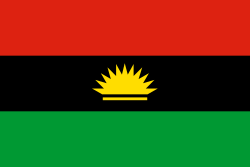Colonial
As intrinsic features of the Igbo social order, communalism and entrepreneurialism pervaded Igbo community structures within the colonial era. [10] This is due in large part to the British colonial institution's imposition of ethnically divisive administrative policies. [10] In the context of colonization, which featured the native population's limited access to economic advantages, there was fierce competition between ethnic groups for employment opportunities. [3] Particularly within coastal southeastern region of the nation, Igbo people's merchant commerce was forced into competition with largely imported industrial commerce and the commercial activities of other groups. [5] Within the context of the Nigerian nationalist movement, these qualities took form in the intra-ethnic competition for national wealth and economic resources. [3] Following the Colonial Development and Welfare Acts put forth the British colonial government in 1945, economic and political power was gradually transferred to native populations— thereby, heightening each group's claims on profitable assets. [5] The Igbo State Union, formerly the Igbo Federal Union, worked alongside the NCNC in ensuring the advancement and welfare of the Igbo people in the furtherance of the Igbo's economic objectives . [3]
Post-colonial
The Igbo pursuit of enrichment in the post-colonial context continued in the pre-colonial and colonial tradition of the pursuit of community enrichment. [5] A large part of Nigeria's post-colonial capitalist economy relied on the exportation of agricultural products. [5] Because of the poor quality of soil in the predominately Igbo southeastern region, many Igbo people began to migrate into the urban centers of other regions. [5] Due to the Igbo people's relatively high levels of education, they were able to take jobs as clerks, traders, and shopkeepers and eventually rise to the ranks of professionals, journalists, and government employees. [5] The affluence of the migrant Igbo population by way of their employment in northern cities by inspired resentment within the resident population following the events of the 1966 military coup. [5] Many of these Igbo individuals were targeted during the 1966 anti-Igbo pogrom which eventually contributed to the onset of the war. [7]
An important factor in the escalation of the Nigerian Civil War was that 70 percent of the nation's oil reserves were located in the eastern region. [13] In attempts to limit support for the secessionist movement, General Gowon proclaimed that the four states that composed Nigeria would be split further into 12 states, granting ethnic minority groups their own governments. [13] One of these newly formed states was Rivers State, which held both precious oil reserves and major city Port Harcourt. [13] Though Rivers State did not join the secessionist movement, the loss of the remaining Biafran states posed similar economic risks to Nigerian economy and profits for the Biafran economy. [13]
During the civil war, the Igbo people's properties were liquidated and destroyed. [3] After Biafra's surrender, the Nigerian government delegitimized all of Biafra's currency and gave all of its former citizens 20 pounds in exchange for any sum of Biafran pounds. [14]
Contemporary
The call for the development of Igboland is especially significant considering the lasting effects of the Nigerian Civil War. As a legacy of the conflict, the Igbo people continue to possess significantly smaller amounts of national resources, particularly including oil. [3] The bulk of Nigeria's resources are owned by Yoruba and Hausa individuals. [3] Additionally, Igbo men and women continue to experience anti-Igbo discriminatory attitudes from members of other ethnic groups that affects the success of their businesses. [3] Groups such as Movement for the Actualization of the Sovereign State of Biafra (MASSOB) perceive the Nigerian government's post-war policies as a form of economic strangulation that has persistently limited the economic agency of the Igbo people. [15]
According to their 2002 Constitution, civil society groups such as Ohanaeze Ndigbo have formed to act as a conduit between the government and the people to negotiate for the socio-economic development of Igbo land. [3]

